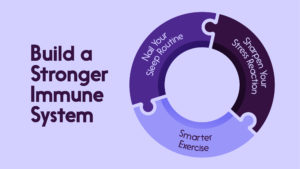It’s safe to say that most of us are doing as much as we can to stay healthy right now. But what’s the best way to build the immune system? Well, there isn’t just one answer. To optimize the body’s ability to fight off illness it’s best to adopt a holistic approach. It’s not just doing one thing, it’s doing many things that, together, support overall health and immunity.
Women’s Health highlighted three main areas of focus and had some experts weigh in on the best immunity-optimizing habits.
“Nail Your Sleep Routine
Sleep—specifically getting at least seven hours most nights—might be the Most Important Thing. “The best data we have about how to improve immunity is on getting the right amount of good sleep,” says E. John Wherry, director of the Institute for Immunology at the University of Pennsylvania. People who got six hours of shut-eye a night or less for one week were about four times more likely to catch a cold when exposed to a virus compared to those who got more than seven hours, according to a study published in the journal Sleep.
“If my sleep schedule gets off track, I recommit to consistent wake-up and bedtimes—even on weekends.” – María de la Paz Fernández, Columbia University
Sharpen Your Stress Reaction
It’s well established that stress prompts the release of cortisol, that fight-or-flight hormone that enables you to run for your life. When cortisol is high, your immune system isn’t as active, says Daniel M. Davis, PhD, professor of immunology at the University of Manchester in England.
Don’t stress? I’ll just give up now, you’re thinking. Stay calm and try this: Instead of attempting to eliminate negativity, refine the way you cope—which will make the blues more manageable and mitigate that cortisol response, Davis says.
“I am a huge believer in the power of gratitude. It’s not woo-woo or weird—it works and we have the science to back it up. I start and finish my days by identifying three specific things that I am grateful for.” – Joy Lere, psychologist
Exercise Smarter
Working out creates inflammation in the body, but it’s the good kind, says Wherry. “It’s a little counterintuitive, because exercise actually disrupts your body’s homeostasis,” he says. But when your sweat sesh is finished, your bod goes back to its status quo—keeping your immunity on its toes in that brilliant way, he says. Research backs this up: Folks who exercise regularly develop more T cells (those destroyer white blood cells) than their sedentary peers.
“I aim to get 20 to 30 minutes of movement every day. Consistent, moderate exercise allows your body to recover and build immunity quicker than over-exercising or not exercising at all.” – Lisa Ballehr, D.O., Institute of Functional Medicine
Boosting the immune system isn’t just about drinking this or doing that, it’s about building a foundation of good habits that work together to keep us healthy. It starts with sleep, stress and exercise and extends to food and drink, personal hygiene and beyond. Just remember, it’s a marathon, not a sprint.




